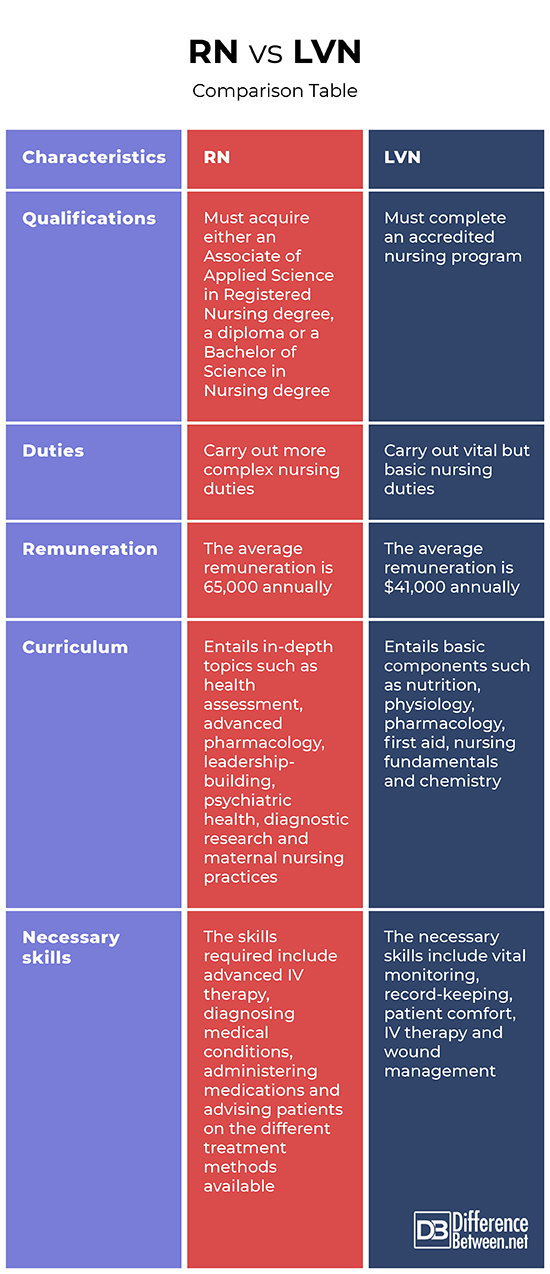Difference Between RN and LVN
Nurses are among the most important frontline caregivers. Without them, health care facilities would be a struggle. And even as the demand for nurses rises, deciding which type of nursing license to pursue can be difficult. Among the nursing licenses available include Licensed Vocational Nursing (LVN), Advanced Practice Nursing (APRN) and Registered Nursing (RN). While the three are nursing licensure, they have different benefits and drawbacks. Also, the services that nurses can offer with each licensure differ. Let’s talk about the differences between RN and LVN.

RN (Registered Nurse)
A registered nurse is a nurse who has either acquired an Associate of Applied Science in Registered Nursing degree, a diploma or a Bachelor of Science in Nursing degree. Most often, these courses take between 2-4 years to complete. Students get to participate in practical clinical experience in a hospital department as well as learn relatable subjects such as physiology, microbiology, chemistry, nursing, nutrition and anatomy.
Among the duties that registered nurses can carry out include:
- Carry out diagnostic testing and results analysis
- Dispensing medications to patients
- Documenting data such as patient’s medical history, symptoms as well as coordinate patients care
- Consult with other medical professionals regarding patient care
- Advise patients on how to manage the illnesses after treatment
- Supervise home care aides, LVNs and nursing aids
RNs can be found in medical hospitals, nesting care facilities, home health care services, military positions, educational services, administrative services, schools, doctors offices and government agencies, just to mention a few.
RNs enjoy a higher compensation compared to LVNs with annual earnings estimate of $65,000 annually.

LVN (Licensed Vocational Nurse)
This is a nurse who has completed an accredited nursing program. The duration of this program is approximately one year and is carried out at community colleges. Among the disciplined studied by LVNs include pharmacology, biology, nursing as well as practical clinical experiences. For a student to qualify, they must pass the National Council Licensure Examination.
While LVNs carry out nursing duties, they have various limitations compared to RNs.
Among the job responsibilities of Licensed Vocational Nurses include:
- Ensure patients are comfortable by providing services such as dressing and bathing
- Keep track of patients’ records
- Provide medical care and basic nursing such as changing bandages and dressing wounds
- Ensure patients understand their health needs by discussing their conditions and how to manage them
- Manage other LVNs who have minimal experience
The average remuneration for a Licensed Vocational Nurse is $41,000 annually.
Similarities between RN and LVN
- Both carry out nursing duties
- Both must be fully qualified to provide the services
Differences between RN and LVN
Qualifications
A registered nurse must acquire either an Associate of Applied Science in Registered Nursing degree, a diploma or a Bachelor of Science in Nursing degree. On the other hand, a Licensed Vocational Nurse must complete an accredited nursing program.
Duties
While Registered Nurses carry out more complex nursing duties, Licensed Vocational Nurses carry out vital but basic nursing duties.
Remuneration
The average remuneration for a registered nurse is 65,000 annually. On the other hand, the average remuneration for a Licensed Vocational Nurse is $41,000 annually.
Curriculum
While RN’s curriculum entails in-depth topics such as health assessment, advanced pharmacology, leadership-building, psychiatric health, diagnostic research and maternal nursing practices, LVN’s curriculum entails basic components such as nutrition, physiology, pharmacology, first aid, nursing fundamentals and chemistry.
Necessary skills
The skills required for RN’s include advanced IV therapy, diagnosing medical conditions, administering medications and advising patients on the different treatment methods available. On the other hand, the necessary skills for LVN’s include vital monitoring, record-keeping, patient comfort, IV therapy and wound management.
RN vs. LVN: Comparison Table

Summary of RN vs. LVN
A registered nurse must acquire either an Associate of Applied Science in Registered Nursing degree, a diploma or a Bachelor of Science in Nursing degree. Since they carry out complex nursing duties, their curriculum entails in-depth topics such as health assessment, advanced pharmacology, leadership-building, psychiatric health, diagnostic research and maternal nursing practices. On the other hand, a Licensed Vocational Nurse must complete an accredited nursing program. Their curriculum entails basic components such as nutrition, physiology, pharmacology, first aid, nursing fundamentals and chemistry While they have differences in terms of qualifications, skills, remuneration and duties, both are vital players in the health care sector.
- Difference Between Profit Center and Investment Center - July 2, 2022
- Difference Between Anti-Trust and Anti-Competition - June 6, 2022
- Difference Between Stocktaking and Stock Control - June 6, 2022
Search DifferenceBetween.net :
Leave a Response
References :
[0]Terry C & Harrington N. LPN to RN Transitions: Achieving Success in Your New Role. Lippincott Williams & Wilkins, 2008. https://books.google.co.ke/books?id=vvqsNEnqfTMC&pg=PA186&dq=Difference+between+rn+and+lvn&hl=en&sa=X&ved=2ahUKEwjloui7xtDwAhXJz4UKHUsVDw8Q6AEwAHoECAIQAg#v=onepage&q=Difference%20between%20rn%20and%20lvn&f=false
[1]Tamara Dahlkemper. Nursing Leadership, Management, and Professional Practice for the LPN/LVN. F.A. Davis, 2017. https://books.google.co.ke/books?id=MSYmDwAAQBAJ&printsec=frontcover&dq=Difference+between+rn+and+lvn&hl=en&sa=X&ved=2ahUKEwjloui7xtDwAhXJz4UKHUsVDw8Q6AEwBnoECAcQAg#v=onepage&q=Difference%20between%20rn%20and%20lvn&f=false
[2]Nancy Duphily. Transitioning From LPN/LVN to BSN. Springer Publishing Company, 2014. https://books.google.co.ke/books?id=fHNPAwAAQBAJ&printsec=frontcover&dq=Difference+between+rn+and+lvn&hl=en&sa=X&ved=2ahUKEwjalYbRxtDwAhWoxIUKHQjSDQ84ChDoATAAegQIAhAC#v=onepage&q=Difference%20between%20rn%20and%20lvn&f=false
[3]Image credit: https://live.staticflickr.com/2518/4118488032_a0f579d5c6_b.jpg
[4]Image credit: https://pixahive.com/wp-content/uploads/2020/11/A-nurse-preparing-tools-in-operation-theatre-180152-pixahive.jpg
